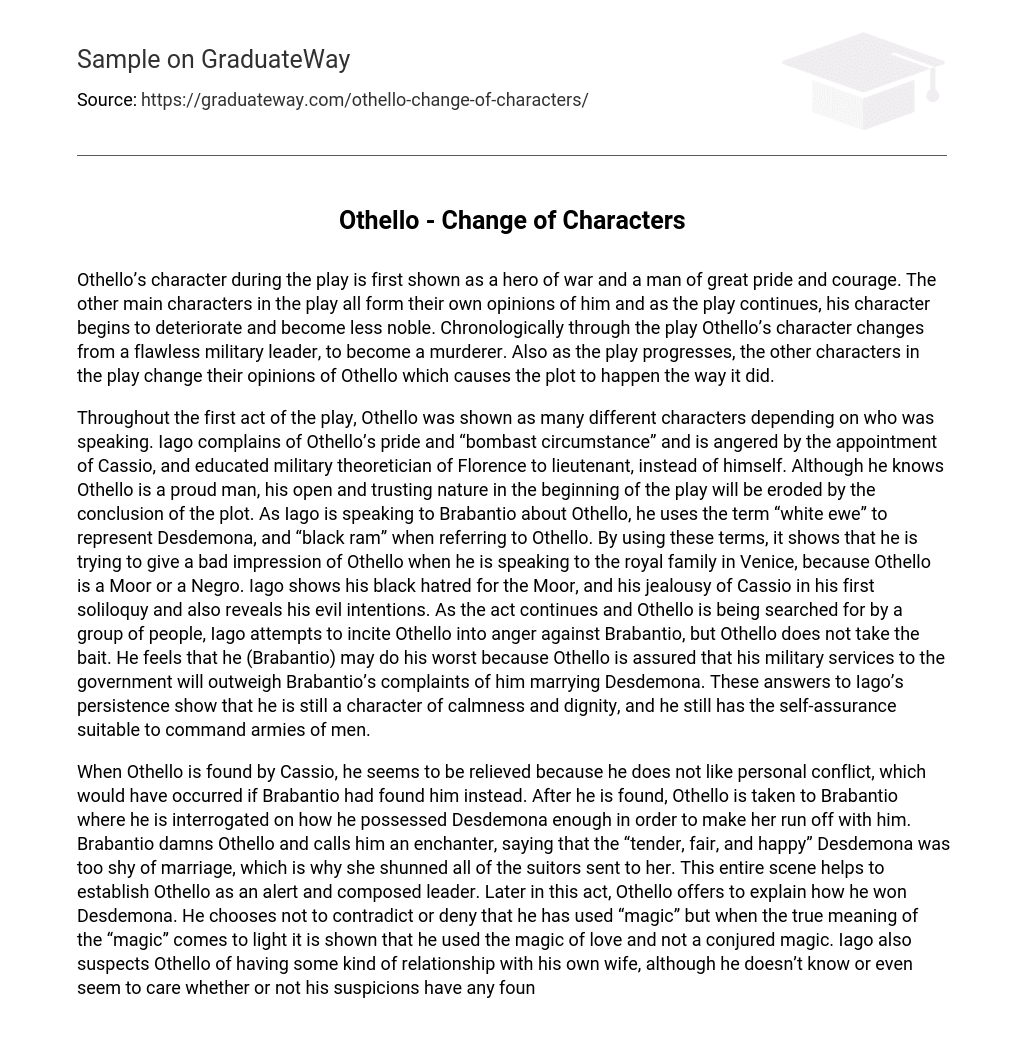Throughout the play, Othello is initially portrayed as a heroic and proud warrior. However, as the story unfolds, his character gradually declines and loses its nobility. Othello’s transformation from an impeccable military commander to a murderer occurs chronologically in the play. Additionally, the evolving perceptions of Othello held by the other characters drive the unfolding of the plot.
Throughout the first act of the play, Othello is portrayed differently depending on who is speaking. Iago complains about Othello’s arrogance and is upset about Cassio, a knowledgeable military theorist, being chosen as lieutenant instead of him. Despite knowing that Othello is proud, his initial open and trusting nature will be eroded by the end of the plot. When speaking to Brabantio about Othello, Iago describes Desdemona as a “white ewe” and refers to Othello as a “black ram.” These descriptions are used to create a negative impression of Othello, considering he is a Moor or a Negro. In his first soliloquy, Iago expresses his deep hatred for the Moor and jealousy of Cassio while revealing his wicked intentions. As the act progresses and a group of people searches for Othello, Iago tries to provoke him into anger towards Brabantio, but Othello doesn’t take the bait. He believes that Brabantio can do whatever he wants because Othello is confident that his military services to the government outweigh Brabantio’s complaints about him marrying Desdemona. These responses to Iago’s persistence demonstrate Othello’s composure, dignity, and self-assurance necessary for leading armies.
Upon encountering Othello, Cassio experiences a sense of relief as he prefers to avoid personal conflict. He acknowledges that if Brabantio had found him instead, it would have resulted in confrontation. Othello is then brought before Brabantio, who interrogates him about how he managed to captivate Desdemona enough for her to elope with him. Brabantio curses Othello and accuses him of enchanting Desdemona and causing her to reject all other suitors. This scene establishes Othello as a composed and attentive leader.
Later on, Othello explains how he won over Desdemona without denying or contradicting the concept of “magic.” He reveals that the “magic” he employed was the power of love rather than sorcery. Iago also suspects that Othello may have been involved in an affair with his own wife but does not know or appear concerned about the accuracy of his suspicions. According to Iago, Othello is considered a “fool” due to his trustworthiness and transparency.
This act serves as an introduction to Othello’s character while illustrating the different reactions other characters have towards his presence.
The remaining acts of the play show how the characters respond to Othello’s lifestyle changes. Despite having to permanently remove Cassio from his position as lieutenant, Othello expresses his enduring love for him. Although he would have preferred to reinstate Cassio immediately, Othello understands the political risks involved. He wants to satisfy Desdemona by reinstating Cassio but acknowledges that he cannot do so, demonstrating his commitment to being a responsible governor who aims to avoid provoking hostilities in the city by granting Cassio a premature pardon.
Desdemona informs Emilia that Othello is not prone to jealousy, which aligns with Othello’s own belief. However, as Act 3 progresses, Othello confides in Iago about his suspicions regarding Desdemona’s motives. This suggests that Othello’s ability to make sound judgments has declined due to Iago’s constant manipulation. Not only is his mental state changing but also his morals and character are deteriorating.
As the play nears its conclusion, the characters continue to express their opinions on Othello. Many characters have changed their initial views of him due to his evident change in attitude, with the exception of Iago and Desdemona. Othello persistently disrespects Desdemona, treating her as if she were a prostitute and Emilia were her owner, while he assumes the role of a buyer. Despite this blatant disrespect, Desdemona remains unwavering in her love and loyalty towards him. However, she does acknowledge that she has reached rock bottom and can only go upward from there, as her beloved has transformed into a “beast.” The final act of the play serves as an opportunity for the characters to articulate their last impressions of Othello and how he has impacted them. The night during which he plans to kill Desdemona is a significant scene, as he still possesses enough awareness to inquire if she has prayed to ensure a clean soul in her death. Upon hearing this question, she comprehends his intentions and pleads with him, questioning why he is taking such action. Until the bitter end, Desdemona maintains her faith in her husband, despite it offering no salvation for her life. She perishes as a result of Othello being manipulated by Iago, with her own innocence having no role in the tragedy.
The conclusion of the play brings an end to the frustration felt by several characters. Each character has a unique perspective on Othello’s character, and throughout the play, many of these perceptions evolve. However, both Iago and Desdemona remain unchanged in their views of Othello. The various characters interpret and evaluate Othello in their own distinct ways, shaping the unfolding of the plot.





